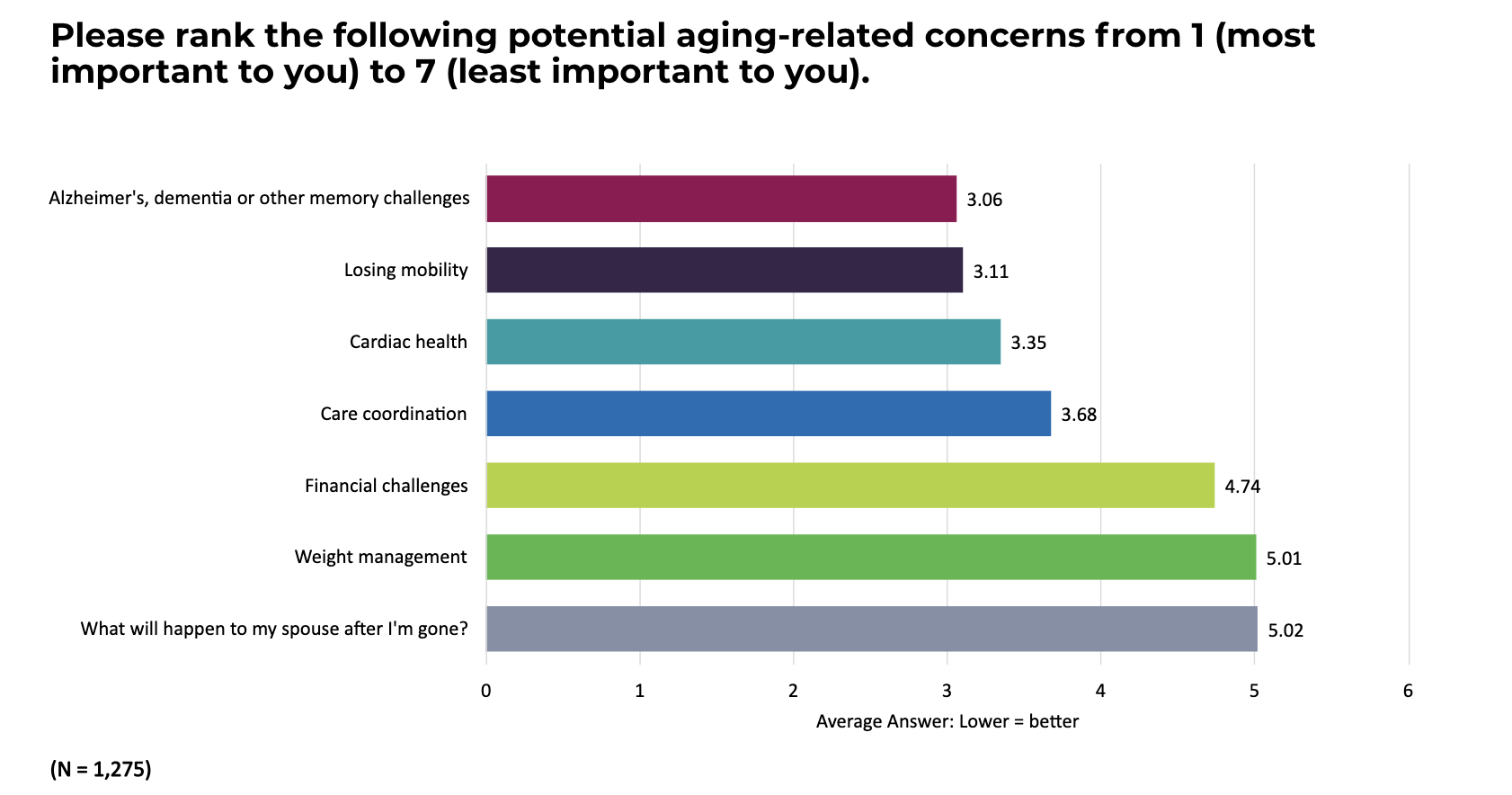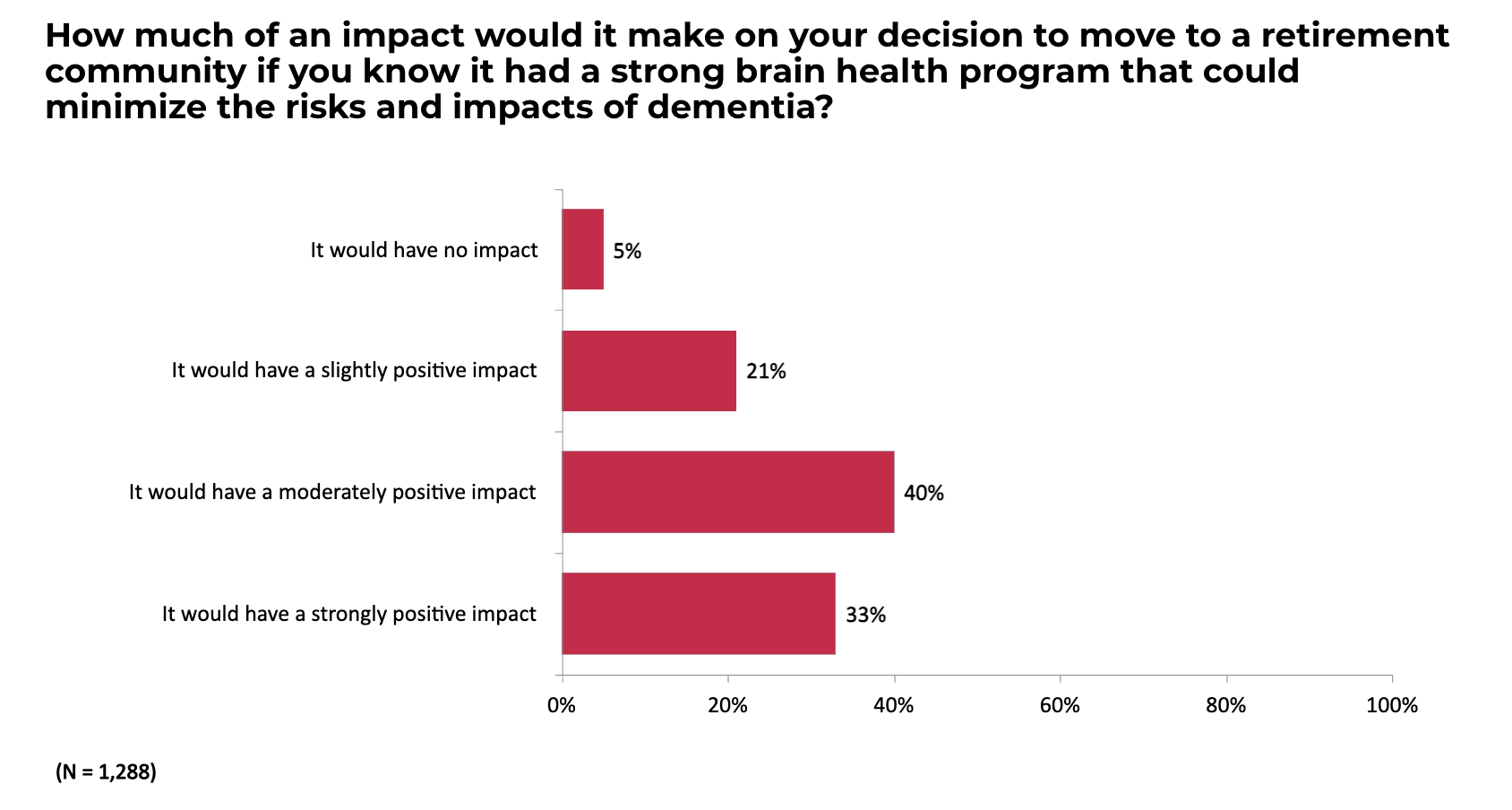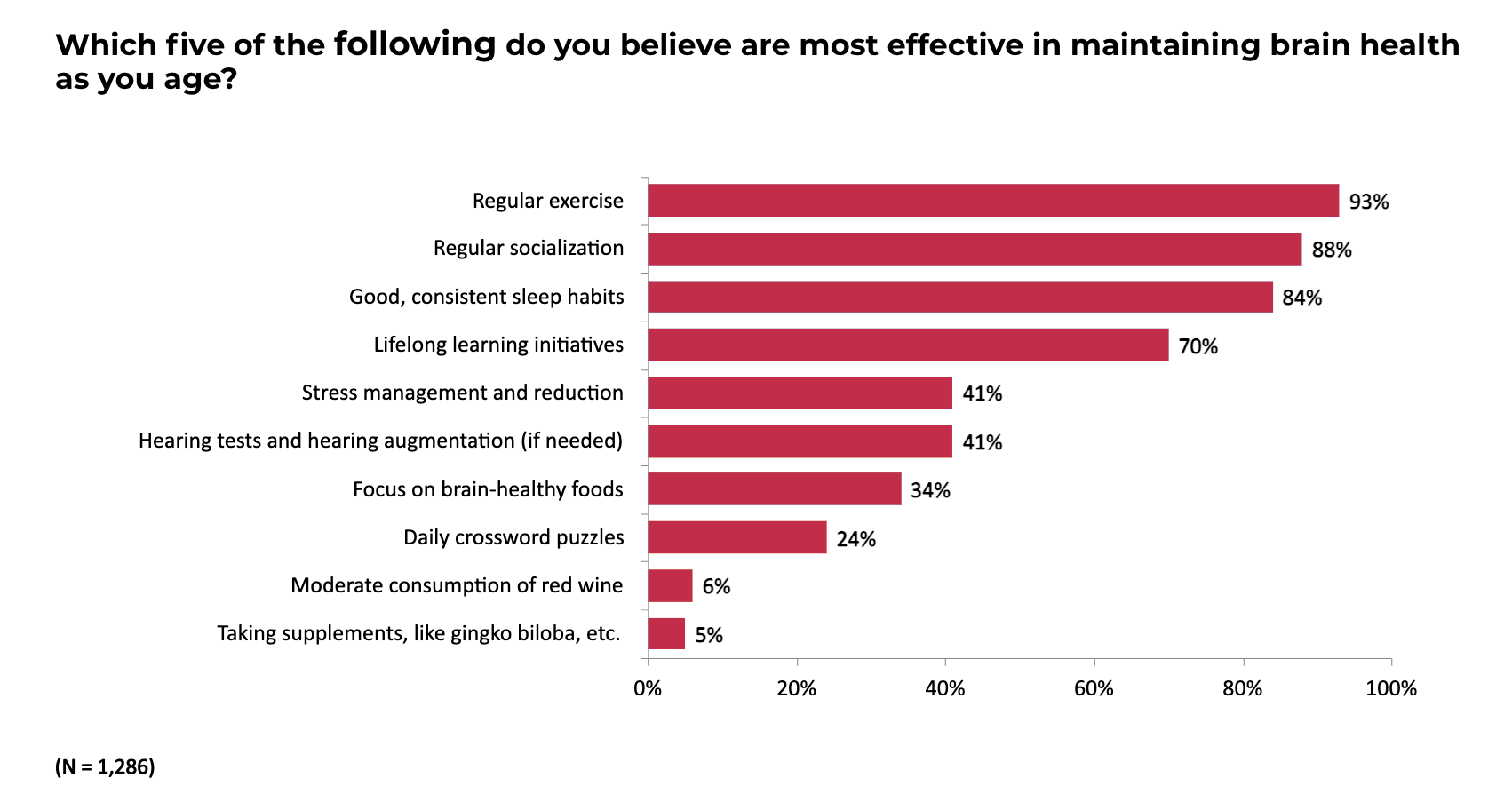Introduction
For today’s older adults, few issues inspire as much fear as Alzheimer’s disease and other forms of dementia. A recent survey completed by Love & Company confirmed what other surveys have consistently shown: that memory loss and cognitive decline are among the greatest concerns people have as they age. While many seniors also worry about mobility or heart health, it is dementia that looms largest in their minds.
At the same time, Life Plan Communities are seeking ways to distinguish themselves in competitive markets. Traditional differentiators such as dining, wellness programs or physical amenities remain important, but they are no longer sufficient to set one community meaningfully apart from another. In this context, brain health programs represent a unique opportunity. Not only do these initiatives respond directly to one of the top aging concerns, but Love & Company’s recent research also suggests that communities offering such programs may enjoy stronger appeal and greater move-in motivation among prospects.
Traditional differentiators such as dining, wellness programs or physical amenities remain important, but they are no longer sufficient to set one community meaningfully apart from another.
Our study sheds light on just how powerful brain health programming can be in influencing decision-making for prospective residents.
Methodology
The survey was conducted to prepare for a brain health conference hosted by Thomas Cuisine, a senior living food service provider based in Boise, Idaho. To better understand how prospective residents value brain health initiatives, an email survey was distributed to lead base members at 15 participating Life Plan Communities. In one case—Goodwin Living in Alexandria, Virginia—the wait list was used instead of the lead base, as it functions similarly to a lead base due to its size and engagement.
A total of 34,290 surveys were sent, yielding 1,604 responses for a response rate of 4.7%, which is a strong response rate for an email survey. This strong sample size provides confident insights into the priorities, perceptions and preferences of people actively considering senior living options.
The participating communities represented a diverse geographic spread, and included:
- Blue Skies of Texas (San Antonio, TX)
- Carroll Lutheran Village (Westminster, MD)
- Covenant Woods (Mechanicsville, VA)
- Edenwald (Towson, MD)
- Friends House (Sandy Spring, MD)
- Goodwin Living (Alexandria, VA)
- Horizon House (Seattle, WA)
- Lakeview Village (Lenexa, KS)
- Lutheran Village at Miller’s Grant (Ellicott City, MD)
- Moorings Park Communities (Naples, FL)
- Pennybyrn (High Point, NC)
- Springmoor (Raleigh, NC)
- St. James Place (Baton Rouge, LA)
- The Village at Germantown (Germantown, TN)
- Westerwood (Columbus, OH)
- Westminster Canterbury Richmond (Richmond, VA)
Survey respondents skewed toward higher education and higher net worth profiles, reflecting the target demographic of many Life Plan Communities. 85% of respondents were aged 70 or older, with 51% of responding households reporting net worth of $2,000,000 or more. In other words, this was a group highly representative of those most likely to consider—and move into—Life Plan Communities.
Key Findings
1. Dementia Is the Top Aging Concern
When asked to rank aging-related concerns, respondents consistently placed Alzheimer’s, dementia and memory challenges at or near the top of the list, followed closely behind by loss of mobility. These fears significantly outweighed financial concerns, weight management and even worries about what would happen to a spouse after death.
This finding underscores a crucial point: If communities can credibly demonstrate they are helping residents reduce dementia risk or slow its progression, they will be speaking directly to one of the most powerful motivators in seniors’ lives.

Alzheimer’s, dementia or other memory challenges were respondents’ top concern.
2. Brain Health Programs Strongly Influence Move Decisions
Perhaps the most striking result of the survey was the impact of effective brain health programs on decision-making. Nearly three out of four respondents (73%) said that knowing a community had a strong brain health program that could minimize the risks and impacts of dementia would have a moderate (40%) or strong (33%) positive influence on their decision of where to move.
This finding was consistent across subgroups—regardless of age, education level or net worth. It suggests that brain health is not just a niche interest, but a broadly shared concern that communities can leverage to appeal to a wide swath of prospects.

Nearly three-quarters of all respondents said that an effective brain health program would have a positive impact on their choice of a community.
3. Dining Choices Matter—Including Brain Healthy Foods
Dining has long been a cornerstone of Life Plan Community marketing, and this survey reinforced its importance. Respondents ranked good-tasting, restaurant-quality food as their top dining priority, followed closely by heart-healthy options. However, foods that promote brain health ranked nearly as high as heart-healthy options and were far ahead of several other dietary categories such as gluten-free, vegetarian or organic options.
This presents a clear opportunity: Communities that align their dining programs with evidence-based “brain-healthy” menus—such as those modeled on the Mediterranean or MIND diets—can meet both the desire for quality dining and the desire for better cognitive outcomes.
4. Brain Health Coaching: A Gap Between Interest and Understanding
When asked about fitness priorities, respondents tended to place greater emphasis on traditional amenities—such as fitness centers, walking paths and group classes—than on specialized brain health fitness programs. Similarly, interest in brain health coaches lagged behind that for fitness, nutrition or mental health coaching.
These results suggest that while many older adults are concerned about their brain health, they likely do not fully recognize the potential of structured, coached and programmatic interventions. This creates both a challenge and an opportunity for communities: Education will be required to build understanding, but the potential payoff is significant.
5. Residents Already Know Some Keys to Brain Health
Encouragingly, respondents demonstrated a relatively good grasp of the lifestyle practices most strongly linked to maintaining cognitive function. Their top choices included regular exercise, socialization, sleep, stress management and lifelong learning.
What was less well understood was the role that structured programs—and particularly dining choices—can play in supporting brain health. This gap further reinforces the importance of communities not just offering these programs but also marketing and educating prospects on their evidence-based impact.

Survey respondents generally had a good sense of what is most effective in maintaining brain health—though some still lean toward more “faddish” approaches.
Conclusion
The findings from this multi-community survey are clear: brain health is both a deeply felt concern and a powerful decision driver for seniors considering Life Plan Communities.
Dementia is feared more than financial decline or even mortality-related worries. Dining choices that promote brain health rank nearly as high as taste and heart health in importance. And, most significantly, nearly three-quarters of prospects report that the presence of a strong brain health program would positively influence their move-in decision.
For Life Plan Communities, the implications are profound:
- Differentiation: In an increasingly competitive senior living marketplace, brain health programs represent a meaningful way to stand out. Communities that can credibly offer evidence-based brain health initiatives will be tapping into one of the strongest motivators in their prospects’ lives.
- Education and Engagement: There is an opportunity to better educate seniors on the benefits of structured brain health programs, particularly including dining strategies and personal coaching. Those who succeed will likely see stronger engagement from prospects and families.
- Market Expansion: Perhaps most excitingly, brain health initiatives may not just shift consumer preferences between communities but may expand the market itself. Adults who previously resisted the idea of moving may be motivated to consider a Life Plan Community if they believe doing so will protect their cognitive vitality.
In short, brain health is not just another wellness offering. It is a potential market game-changer. Communities that invest in robust, evidence-based programs—encompassing dining, fitness, coaching and lifelong learning—are not only improving residents’ quality of life, but also positioning themselves to thrive in an ever-more competitive environment.
To hear Rob talk more about brain health, please enjoy this brief episode of Thomas Cuisine’s Well-Being ThinkTank podcast:




